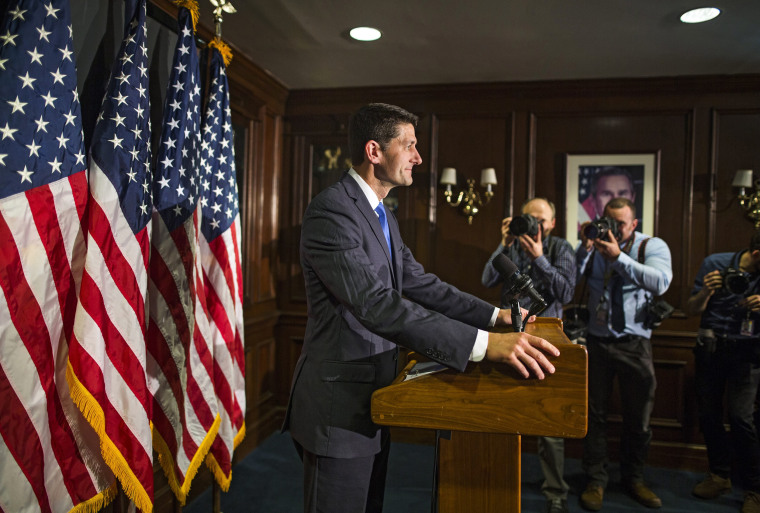House Speaker Paul Ryan will not be the Republican Party's presidential candidate, as he made clear again on Tuesday when he ruled out the possibility of accepting the nomination at the GOP convention in July. "Let me be clear: I do not want, nor will I accept the Republican nomination," Ryan said at a press conference.
But Ryan is running a campaign this fall -- one to keep his own job as House Speaker by creating an identity for congressional Republicans that is distinct from Ted Cruz, Donald Trump or whoever emerges as the GOP presidential nominee.
Ryan is part of a broad effort from congressional Republicans to take subtle but clear steps to cast themselves as independent from the presidential process. Ryan released a flashy online video last week that urged Americans to avoid “identity politics” and instead called for a “battle of ideas” in 2016, in which conservatives and liberals have a sincere debate over which party’s vision is to best achieve shared goals like economic growth. (That video stoked speculation of a Ryan candidacy, forcing him to pledge unequivocally that he will not be a candidate.)
Identity politics is a phrase that generally refers to political appeals based on race, gender or other cultural issues. While Ryan did not say which politicians he viewed as practicing identity politics, Hillary Clinton has made combating racial and sexual discrimination a central part of her campaign, while Trump has made some comments that many view as racist.
In an interview with the Associated Press published last week, Ward Baker, who is in charge of the re-election arm for Senate Republicans, said GOP candidates should campaign as if they are “running for sheriff” in their home states. Senate Republicans, Baker argued, should be focused on issues relevant to their local communities, not weighing in constantly on comments from the presidential candidates.
Several Republican congressional candidates, including New Hampshire Sen. Kelly Ayotte and North Carolina's Richard Burr, told CNN this week that they were unlikely to attend the convention in Cleveland, instead spending that week in their states.
"Not running does not mean I'm going to disappear," Ryan said on Tuesday. "There is a big debate going on right now. It's about what kind of country we're going to be. As Speaker of the House, I believe I have not just an opportunity but an obligation to advance that debate."
He added, "this job provides a platform to communicate a conservative vision for our country. And I'm intent on using it. This is a critical role that has to be played and I am in a position to play that role."
Neither Ryan nor Baker invoked the name Trump directly. But GOP strategists are very worried the real estate mogul, if the party’s nominee, will not only lose the presidential race but could imperil House and Senate incumbents. Trump could either depress GOP turnout, with conservative-leaning voters staying home and therefore not casting votes in key congressional races, or alternatively, opposition to Trump could inspire heavy Democratic turnout, also resulting in Republican losses.
Republicans control 246 of the House’s 435 seats, so it would require a huge anti-GOP wave for Democrats to win control of the House. But Republicans hold only 54 Senate seats, and they must defend seats in Florida, Illinois, New Hampshire, Ohio, Pennsylvania and Wisconsin, all states President Obama won in 2008 and 2012.
It’s nothing new for parties to try to separate themselves from their leaders. Many congressional Republicans were unwilling to campaign alongside George W. Bush in 2006, after his poll numbers had declined. Many Democrats, particularly in more conservative areas, emphasized their opposition to some of President Obama’s policies in the 2010 and 2014 races.
This approach often does not work, since voters view the president or a nominee as the leader and representative of a political party. Republicans lost control of Congress in 2006, and Democrats were defeated in both 2010 and 2014.
Republican candidates in 2016 will have an even harder time distancing themselves from Cruz or Trump, since the GOP nominee will himself be on the same ballot as the House and Senate hopefuls.
Ryan’s call for a “battle of ideas” is not purely about politics. Since he rose to prominence in 2010, the Wisconsin Republican has urged his party to move beyond simply opposing Obama to creating a comprehensive conservative policy vision. That effort has largely failed.
Mitt Romney picked Ryan as his running mate, but did not embrace Ryan’s ideas to completely overhaul Medicare and Social Security. Outside of immigration, Trump rarely speaks in detail about major policy issues.
2016 presidential candidates more aligned with Ryan’s vision, such as ex-Florida Gov. Jeb Bush, Florida Sen. Marco Rubio and Wisconsin Gov. Scott Walker, all failed to inspire voters.
